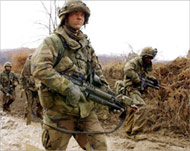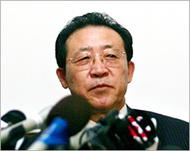North Korea nuclear talks suspended
Envoys to North Korean disarmament talks have announced a three-week recess after 13 days of meetings, deadlocked over what the North would receive for renouncing atomic weapons and its insistence on retaining a peaceful nuclear programme.

Talks are to resume the week of 29 August, Chinese Vice-Foreign Minister Wu Dawei said on Sunday.
However, he warned: “I can’t say for sure that we will reach agreement,” even after the break.
The suspension was announced after the chief envoys from the six governments met on Sunday morning in a final effort to produce a statement of principles meant to guide future negotiations aimed at persuading North Korea to give up nuclear development.
The disagreement over “peaceful nuclear activity” was “one of the very important elements that led us to fail to come up with an agreement”, said Kim Kye Gwan, the chief North Korean delegate.
Kim, who spoke to reporters outside the North’s embassy in Beijing, also insisted that the United States remove its “nuclear threat” from the Korean peninsula.
“We had to produce nuclear weapons because the United States is threatening us with nuclear weapons,” he said.
Consultations
About 32,500 US troops are based in South Korea, but Washington says that no nuclear weapons are deployed there and that it has no intention of invading the North.
 |
|
About 32,500 US troops are based |
Wu said the “six parties will report to their respective governments and study ways to solve the differences” during the recess.
“They are supposed to maintain contact and consultations during that recess,” Wu told reporters outside the building where the three-hour meeting took place.
The chief US envoy, Assistant Secretary of State Christopher Hill, stood beside Wu for photos but made no comment.
China, the meeting’s host, issued a “chairman’s statement” instead of the planned joint statement.
It said the governments “reaffirmed that the goal of the six-party talks is the denuclearisation of the Korean Peninsula in a peaceful manner and agreed to issue a common paper to this end”.
Deadlock
Diplomats say the talks are deadlocked over the North’s insistence on retaining “peaceful nuclear activities” and what it would get for giving up its arms programme.
 |
|
Kim Kye Gwan insisted the US |
The North also wants aid in exchange for freezing nuclear development, and then more for dismantling the programme.
Washington wants the programme verifiably dismantled before providing any rewards.
The dispute erupted in late 2002 after US officials said the North admitted violating a 1994 deal by embarking on a secret uranium enrichment programme.
Pyongyang later withdrew from the international Nuclear Non-proliferation Treaty (NPT).
In February, the North claimed it had nuclear weapons.
Inspections
Hill met Chinese and North Korean officials on Saturday in what he said was an attempt to find ways to speed up the negotiations, but he said the meeting made little progress.
On Friday, he had challenged the North’s insistence on retaining a peaceful nuclear programme, pointing to its record of converting a research reactor for weapons use.
He was referring to the North’s main nuclear complex at Yongbyon, purportedly built for research with Soviet assistance but later turned into the headquarters for Pyongyang’s nuclear weapons programme.
North Korean leader Kim Jong-il had said his isolated government would rejoin the NPT and admit international inspectors if the Beijing talks were successful.